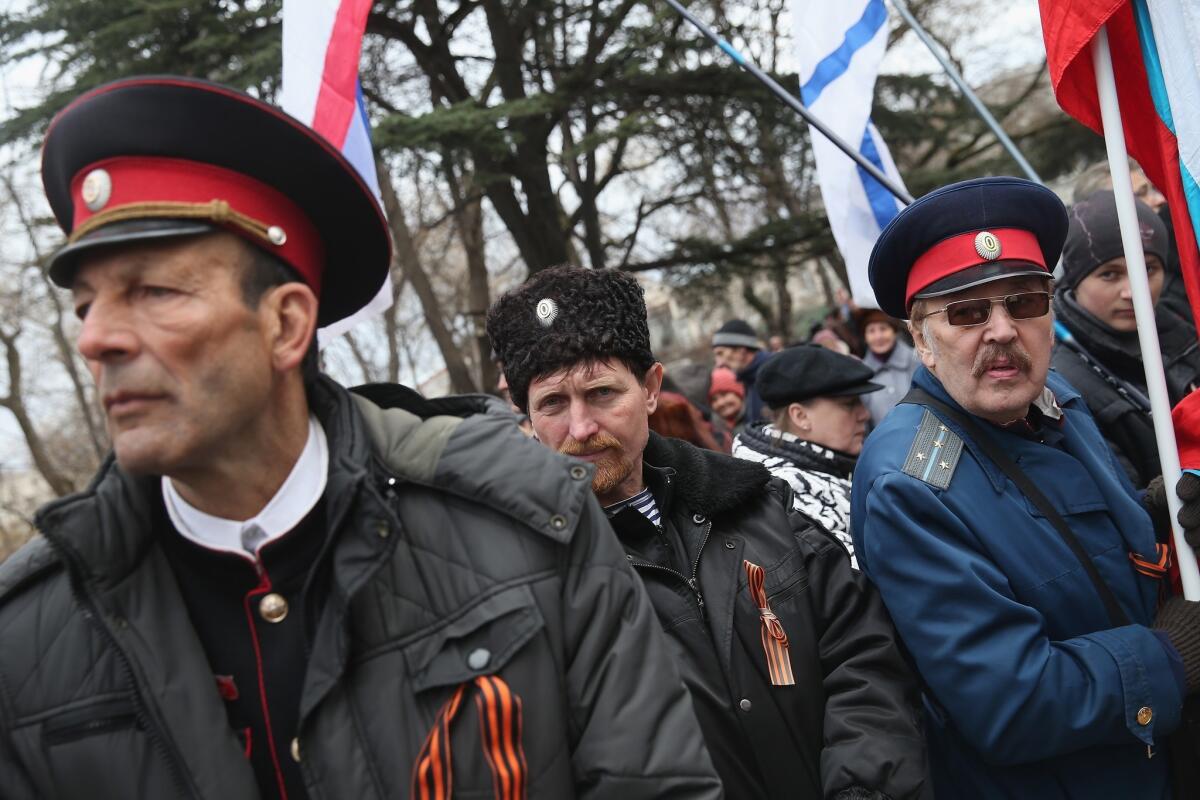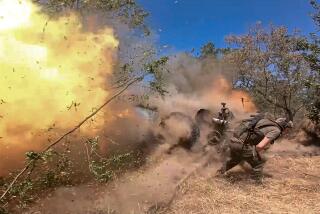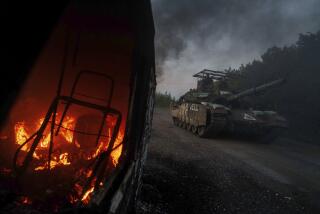Ukrainian leader accuses Moscow of trying to seize territory

KIEV, Ukraine – Authorities closed airspace over Ukraine’s Crimean peninsula and at least five Russian transport planes landed at a military air strip near the regional capital late Friday, as the country’s acting president accused Moscow of trying to seize territory.
A duty officer at the Simferopol airport said that all commercial takeoffs and landings had been canceled from the Crimean regional capital’s airport for at least 24 hours. In Kiev, Oxana Ozhigova, a spokeswoman for the Ukrainian capital’s Borispol airport, confirmed that flights to and from Simferopol had been suspended.
Ukrainian news media reported disruptions “by unknown persons” of telephone and Internet communications, and said that the Krym regional television station had been surrounded by gunmen.
The ominous military and security moves appeared intended to demonstrate the Kremlin’s determination to secure its leased port at Sevastopol, from which Russian naval might is projected to the world. Crimea hosts the Russian Black Sea fleet and has the largest population of Russian speakers in Ukraine.
Acting Ukrainian President Oleksandr Turchynov said Russia was trying to seize territory in Crimea and “provoke us to a military conflict.”
Turchynov’s representative in Crimea, Sergei Kunitsin, later said in televised remarks that 13 Russian jumbo jets landed at Gvardeyskoye, near Simferopol, carrying an estimated 2,000 Russian paratroopers.
The Ukrainian army is ready to respond in the event of “direct aggression” by Russian forces, the newly appointed head of Ukraine’s Security Council, Andriy Parubiy, said in a televised statement in Kiev.
“If there are more active actions on the part of the Russian Federation and its troops, Ukraine’s army and its border troops will of course take adequate measures,” Parubiy said.
Kiev retains control over Ukrainian military forces in the western and central areas of the country, and even most Russian-leaning areas of eastern Ukraine have refrained from defying the new government.
But troops in Crimea may not be reliable in the face of the local population’s rejection of Kiev authority, and with Russia gunmen deployed at airports and communications centers, it was unclear to what extend the capital could bring in forces to challenge the reported Russian buildup.
Though the military and ad hoc movements ratcheted up tension on the peninsula, no shots have been fired and the Kremlin, in its few statements of acknowledgment of the brewing hostility has denied that its troops were involved.
Earlier Friday, dozens of armed and masked men wearing Russian military fatigues without insignia stationed themselves at the Simferopol airport and patrolled its parking lot. Travelers arrived and departed normally until early evening, when the airspace was closed. It was unclear on whose orders commercial aviation was halted.
Much of Crimean Russians’ mistrust of Kiev and its new leaders was provoked by nationalist lawmakers’ attempts to change the status of the Russian language in the eastern regions of the country where it is officially recognized as a mother tongue. The bill never went into effect as Turchynov said he would veto it, but Kremlin-controlled news reports received in Crimea have failed to note that the legislative move has been renounced.
Acting Interior Minister Arsen Avakov called the armed takeover of strategic sites in Crimea “an armed invasion and occupation.”
The Ukrainian parliament, now dominated by politicians with what were opposition parties just a week ago, called on the U.N. Security Council to take up the issue of illegal interference in Ukraine’s affairs, claiming that Russian forces were “directly involved.”
But no effective action or even statements of censure were expected to come out of the world body because Russia wields veto power as a permanent member.
In the Russian city of Rostov-on-Don, just across the border, Ukrainian President Viktor Yanukovich appeared in public for the first time since fleeing Kiev a week earlier. He said at a packed news conference that he had been forced to escape Kiev and seek Russia’s protection because of threats to his life and his family’s by “nationalist and fascist thugs” who seized power after a Feb. 21 European Union-brokered agreement to quell violence.
The deadly denouement of a three-month rebellion against Yanukovich took 82 lives last week and left the capital’s central Independence Square, or Maidan, a smoldering shambles. He is wanted on a Ukrainian Interior Ministry warrant alleging culpability in mass murder for last week’s crackdown.
Yanukovich, who claims to still be the legitimate president of Ukraine, blamed the disorder and communal clashes in Crimea on Western diplomats who brokered the agreement that stopped the bloodshed on Maidan, accusing them of failing to hold the opposition forces now running the Ukrainian government to the letter of the pact.
While Crimea has been thwarting Kiev’s authority over the peninsula, Russian President Vladimir Putin has studiously avoided comment, much less overt intervention.
Putin’s only reported actions over the last two days of Russian nationalist takeovers in Crimea have been to order the Russian government to work out humanitarian aid for Crimea, to discuss economic and trade cooperation with united Ukraine and to open talks with the International Monetary Fund on a rescue package for its deeply indebted and divided neighbor.
But Putin also ordered military drills this week to test the “combat readiness” of Russian troops in the western and central regions of the country, creating a pretext for fighter jet sorties and tank and troop movements around Ukraine’s borders that have fed suspicion that the Kremlin could intervene militarily.
Yanukovich sent mixed signals on the role he would like to see Russia play in restoring what he called Ukraine’s constitutional order, meaning his return to the presidency.
Russia has considerable industrial interests and economic agreements in Ukraine, he said in answer to a question of whether he wanted intervention by Moscow.
“Russia has the right to act. I think that Russia should and must act,” he said at the news conference carried live by Russia-24 television. “Knowing the character of Vladimir Vladimirovich Putin, I am surprised that he is until now so restrained and silent” on the subject of Ukraine’s tumult.
He said Crimean Russians’ fear and anger are “understandable,” but appealed to his supporters there: “Do not allow blood to be shed or for conflict to begin. As the legitimate president of Ukraine, I think Crimea should be part of the Ukrainian state with its autonomous rights ensured.”
Asked whether Moscow should send troops to restore order and allegiance, Yanukovich said the “self-defense units” appearing in Crimea to protect the Russian community were capable of doing the job themselves.
Also on Friday, Swiss authorities said in Geneva that they had launched a criminal investigation of Yanukovich and his son, Aleksander, after searching and seizing documents from a business owned by the Ukrainian president there. The office of Geneva’s chief prosecutor, Yves Bertossa, said in a statement on its website that investigators were looking at allegations of “aggravated money laundering.”
Ukraine’s newly installed interim prime minister, Arseny Yatsenyuk, charged Thursday that the former government had plundered the country’s finances and siphoned off about $70 billion to private offshore accounts since Yanukovich came to power in 2010. During the last three years, Yatsenyuk said, Ukraine’s gold and hard currency reserves had plunged to $15 billion from $37 billion.
sergei.loiko@latimes.com
carol.williams@latimes.com
Loiko reported from Kiev and Williams from Moscow.
More to Read
Sign up for Essential California
The most important California stories and recommendations in your inbox every morning.
You may occasionally receive promotional content from the Los Angeles Times.











